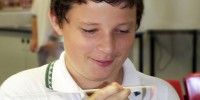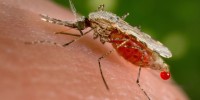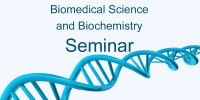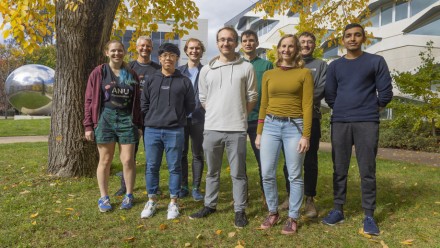Maier Group - Molecular mechanisms of malaria pathogenesis
The research questions we are trying to answer are revolving around "How do malaria parasites survive in the host?", "What is are the mechanisms of sexual differentiation?", and "What special roles do lipids play in the life-cycle progression of the malaria parasite?". Hence the Maier Group focusses on the identification of molecules involved in malaria pathogenesis and transmission. In order to elucidate the functions of these molecules we use biochemical, molecular, genetic and cell biological techniques. The long-term goal is not only to identify and develop new intervention strategies against malaria, but also to understand the underlying biological principles.
The Maier Group is also interested in adaptations to the parastic life-style and the impact of parasites more broadly.
Group Leader
Honorary Professor
Honours Students
PhD Students
 Zala Gluhic
Zala Gluhic Maxim Karnetzki
Maxim Karnetzki Florian Kirscht
Florian Kirscht Kwong Sum Lam
Kwong Sum Lam Jiwon (Joanne) Lee
Jiwon (Joanne) Lee Alexander Penning
Alexander Penning SaiShyam Ramesh
SaiShyam Ramesh
Research Officer
Technical Assistant
Visiting Fellow
Selected publications
- Alexander G. Maier and Christian Doerig: “The sexy side of parasites”: How parasites influence host sex and how the sex of the host impacts parasites, Molecular and Biochemical Parasitology (2022); 248: 111462.
- Kai Matuschewski and Alexander G. Maier: Pas-de-deux: African Plasmodium falciparum adaptations to sickle hemoglobin, Trends in Parasitology (2022); S1471-4922(22)00010-1.
- Melanie Ridgway, Daniela Cihalova, Simon Brown, Todd Mitchell, Alexander G. Maier: Analysis of sex-specific lipid metabolism in P. falciparum gametocytes points to importance of sphingomyelin for gametocytogenesis, Journal of Cell Science (2022); 135 (5); jcs259592.
- Tanima Dutta, Eva-Rachele Pesce, Alexander G. Maier and Gregory L. Blatch: Role of the J Domain Protein family in the survival and pathogenesis of the malaria parasite, accepted In: Addmore Shonhai and Gregory Blatch, eds. Heat Shock Proteins of Malaria 2nd edition (2021), Springer
- Melanie Ridgway, Daniela Cihalova, Alexander G. Maier: Sex-specific separation of Plasmodium falciparum gametocyte populations, Bio-protocol (2021); 11 (11): e4045.
- Merryn Fraser, Kai Matuschewski, Alexander G. Maier: Of Membranes and Malaria: Phospholipid Asymmetry in Plasmodium falciparum-Infected Red Blood Cells, Cellular and Molecular Life Sciences, 2021, May;78(10):4545-4561.
- Merryn Fraser, Weidong Jing, Stefan Bröer, Florian Kurth, Leif-Erik Sander, Kai Matuschewski, Alexander G. Maier: Breakdown in Membrane Asymmetry Regulation Leads to Monocyte Recognition of Plasmodium falciparum-infected Red Blood Cells, PLoS Pathogens, 2021; 17(2): e1009259.
- Francois Korbmacher, Benjamin Drepper, Theo Sanderson, Peer Martin, Thomas Stach, Alexander G. Maier, Kai Matuschewski, Joachim M. Matz: An apicoplast-resident folate transporter is essential for sporogony of malaria parasites, Cellular Microbiology, 2021; 23(1): e13266.
- Melanie C. Ridgway, Kwong S. Shea, Daniela Cihalova, Alexander G. Maier: A novel method for the separation of male and female gametocytes of the malaria parasite Plasmodium falciparum that enables biological and drug discovery, mSphere, 2020, 5 (4): e00671-20.
- Sanketha Kenthirapalan, Phuong N. Tran, Taco W. A. Kooij, Melanie C. Ridgway, Manuel Rauch, Simon H. J. Brown, Todd W. Mitchell, Kai Matuschewski, Alexander G. Maier: Distinct Adaptations of a Gametocyte ABC Transporter to Murine and Human Plasmodium Parasites and Incompatibility in Cross-species Complementation, International Journal for Parasitology 2020, 50 (6-7):511-522.
- Wenn-Chyau Lee, Bruce Russell, Radoslaw Mikolaj Sobota, Khairunnisa Ghaffar, Shanshan W. Howland, Zi Xin Wong, Alexander G. Maier, Dominique Dorin-Semblat, Subhra Biswas, Benoit Gamain, Yee-Ling Lau, Benoit Malleret, Cindy Chu, François Nosten, Laurent Rénia: Plasmodium-infected erythrocytes induce secretion of IGFBP7 to form type II rosettes and escape phagocytosis, eLife 2020; 9:e51546.
- Anna-Sophie Juergens & Alexander G. Maier: “The Parasite as Performer” - Parasites, Clowns and the Circus, Journal of Science & Popular Culture 2020, 3 (1): 39-56
- Denise Higgins, Adelaide Dennis, Angela Stoddard, Alexander G. Maier, Susan Howitt: “Power to empower”: conceptions of teaching and learning in a pedagogical co-design partnership, Higher Education Research & Development 2019, 38(6): 1154-1167.
- Alexander G. Maier, Kai Matuschewski, Meng Zhang, Melanie Rug: Plasmodium falciparum, Trends in Parasitology 2019, 35(6): 481-482.
- Alexander G. Maier: “Now I feel like a true parasitologist” - Concept-based training for Early Career Scientists, Veterinary Parasitology 2018; 252: 80-84.
- Erick T. Tjhin, Christina Spry, Alan L. Sewell, Annabelle Hoegl, Leanne Barnard, Anna E. Sexton, Vanessa M. Howieson, Alexander G. Maier, Darren J. Creek, Erick Strauss, Rodolfo Marquez, Karine Auclair and Kevin J. Saliba: Mutations in the pantothenate kinase of Plasmodium falciparum confer diverse sensitivity profiles to antiplasmodial pantothenate analogues PLoS Pathogens, 2018;14(4):e10069
- Meng Zhang, Pierre Faou, Alexander G. Maier,* Melanie Rug*: Plasmodium falciparum export protein PFE60 plays a role in Maurer’s clefts architecture, International Journal for Parasitology 2018; 48: 83-95
- Phuong N. Tran, Cameron Tate, Melanie C. Ridgway, Kevin J. Saliba, Kiaran Kirk and Alexander G. Maier: Human dihydrofolate reductase influences the sensitivity of the malaria parasite Plasmodium falciparum to ketotifen - a cautionary tale in screening transgenic parasites International Journal for Parasitology: Drugs and Drug Resistance, 2016 6, 179-183
- Phuong N. Tran, Simon H. J. Brown, Melanie Rug, Melanie C. Ridgway, Todd W. Mitchell and Alexander G. Maier: Changes in lipid composition during sexual development of the malaria parasite Plasmodium falciparum; Malaria Journal, 2016 Feb 6, 15:73
- Melanie Rug, Marek Cyrklaff, Antti Mikkonen, Leandro Lemgruber, Simone Kuelzer, Cecilia Sanchez, Jennifer Thompson, Eric Hanssen, Matthew O’Neill, Christine Langer, Michael Lanzer, Freddy Frischknecht, Alexander G. Maier and Alan F. Cowman: Export of virulence proteins by malaria-infected erythrocytes involves remodelling of host actin cytoskeleton; Blood, 2014 Nov 27;124(23):3459-68
- Phuong N. Tran, Simon H. J. Brown, Todd W. Mitchell, Kai Matuschewski, Paul J. McMillan, Kiaran Kirk, Matthew W. A. Dixon and Alexander G. Maier: A female-gametocyte-specific ABC transporter plays a role in lipid metabolism in the malaria parasite Nature Communications, 2014 Sep 8;5:4773.
- Alexander G. Maier: The Malariologist’s Molecular Toolbox, In: Jane Carlton, Susan Perkins, Kirk Deitsch eds. Malaria Parasites - Comparative Genomics, Evolution and Molecular Biology (2012). Hethersett, Norwich, UK: Horizon Scientific Press
- Alexander G. Maier, Brian M. Cooke, Alan F. Cowman and Leann Tilley: Malaria parasite proteins that remodel the host erythrocyte, Nature Reviews Microbiology, 2009 May 7 (5): 341-354
- Alexander G. Maier, Melanie Rug, Monica Brown, Matthew T. O’Neill, Srabasti Chakravorty, Tadge Szestak, Joanne Chesson, Yang Wu, Katie Hughes, Ross Coppel, Chris Newbold, James Beeson, Alister Craig, Brendan S. Crabb and Alan F. Cowman: Exported Proteins Required for Virulence and Rigidity of Plasmodium falciparum-Infected Human Erythrocytes, Cell, 2008 Jul 11, 134:48-61
- Alexander G. Maier*, Melanie Rug*, Matthew T. O’Neill, James Beeson, Matthias Marti, John Reeder and Alan F. Cowman: Skeleton Binding Protein 1 functions at the parasitophorous vacuolar membrane to traffic PfEMP1 to the Plasmodium falciparum-infected erythrocyte surface, Blood 2007 Feb, 109(3): 1289-1297
- Manoj T. Duraisingh, Alexander G. Maier, Tony Triglia and Alan F. Cowman: The erythrocyte binding antigen-175 functions in invasion of human erythrocytes by Plasmodium falciparum utilizing sialic acid-dependent and -independent pathways, Proceedings of the National Academy of Sciences 100 (8) (2003) 4796-4801
- Alexander G. Maier, Manoj T. Duraisingh, John C. Reeder, Sheral S. Patel, James W. Kazura, Peter A. Zimmerman and Alan F. Cowman: Plasmodium falciparum erythrocyte invasion via glycophorin C and selection for Gerbich-negativity in human populations, Nature Medicine 9 (1) (2003) 87-92.

'Concepts in Parasitology' at ANU Canberra and Kioloa Coastal Campus

The battle to beat the malaria parasite

BSB PhD Exit Seminar: Plasmodium falciparum lipid metabolism as a target for malaria intervention strategies

Forward genetic screening identifies a link between Plasmodium falciparum fever response, artemisinin resistance and the algal origins of the apicoplast

Feeling hot in here: thermotolerance and drug sensitivity in malaria parasites

Chromatin structure and epigenetics in Plasmodium falciparum
The genome of the malaria parasite Plasmodium falciparum is maintained primarily as transcriptionally competent, euchromatin with only rest

Roles of IgM in immunity to malaria in humans
A key mediator of protective immunity to malaria is antibodies that block merozoite invasion of the RBC.

Targeting host cell factors as a novel anti-malarial strategy
Malaria causes a significant health burden worldwide. An efficient vaccine has yet to be developed but a handful of treatment options exist.

New tools for malaria eradication: integrated packages for geospatial mapping, population-based sampling and high-sensitivity testing
Malaria elimination/ eradication has been a global policy for the past decade and has enabled some tremendous achievements.

















